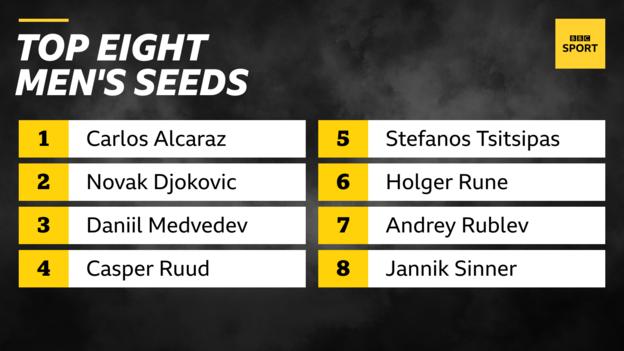| Venue: All England Club Dates: 3-16 July |
| Coverage: Live across BBC TV, radio and online with comprehensive coverage on BBC iPlayer, the BBC Sport website, BBC Sport mobile app and Red Button. |
Novak Djokovic is famous for his dedication and meticulous preparation, so it is surprising to learn he might let some of his strict routine slip as he tries to make more tennis history this fortnight.
The Serb, who begins his bid for a record-equalling eighth men’s Wimbledon singles title against Argentina’s Pedro Cachin on Monday, is widely seen as the tournament favourite despite being seeded second behind Carlos Alcaraz.
Djokovic has a 24th Grand Slam in his sights and is halfway to becoming the first ATP or WTA singles player since Steffi Graf in 1988 to complete a Calendar Slam, by winning all four major tournaments in the same year.
He has already triumphed at the Australian Open and Roland Garros in 2023 and the lessons the 36-year-old learned on his way to those wins have showed him he does not have to be a perfectionist to progress in SW19.
“Routines are extremely important for every human being because I think it is in our biology that we are repetitive on a daily basis,” Djokovic explained. “If there is something that makes us feel good, we want more of it.
“I am definitely a guy who likes them because then I feel more comfortable with my preparation, so that I feel more confident in myself that I’ve done everything I possibly need to do for what is coming up.
“Routines really give me peace of mind, but it is important to balance it out sometimes by breaking them. Now I like to play a game with my brain sometimes, and challenge it.
“For example, I did not train at all in the days between matches at the Australian Open, when I was injured, but at Roland Garros I had two of those days between matches where I didn’t train as well.
“That is something that, earlier in my career, I would probably have not accepted because I had the mentality of a hard worker, and I had to do that extra 10 minutes or half an hour.
“I used to be a bit more upset with myself if I didn’t do something – it would be like ‘you’re not good enough now’, or ‘you are going to lose now’, but over time I guess you grow out of that mentality.
“I have learned that less is more and also that if I break my routine or don’t complete it, it’s also fine. It’s important not to be too hard on yourself.”
Will Wimbledon grass be on his…
Click Here to Read the Full Original Article at BBC Sport – Tennis…

